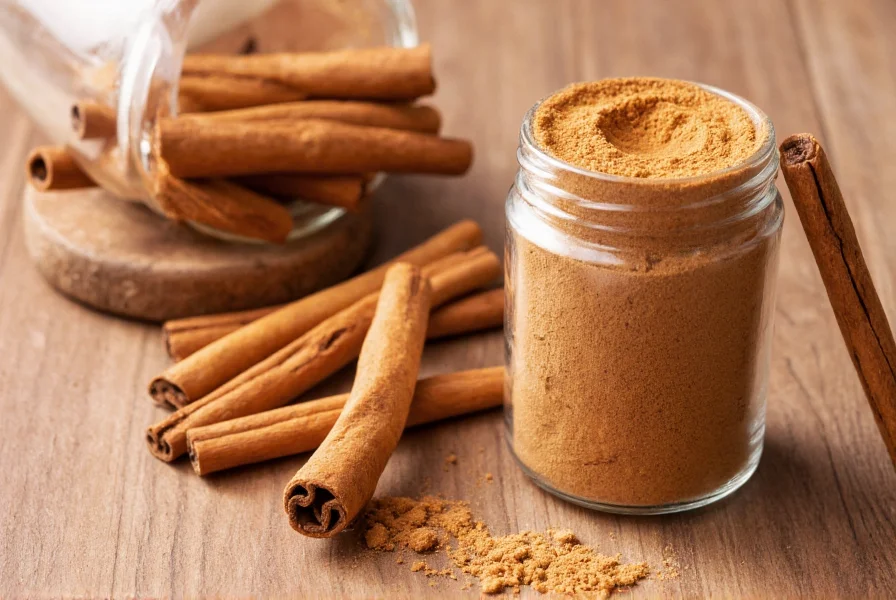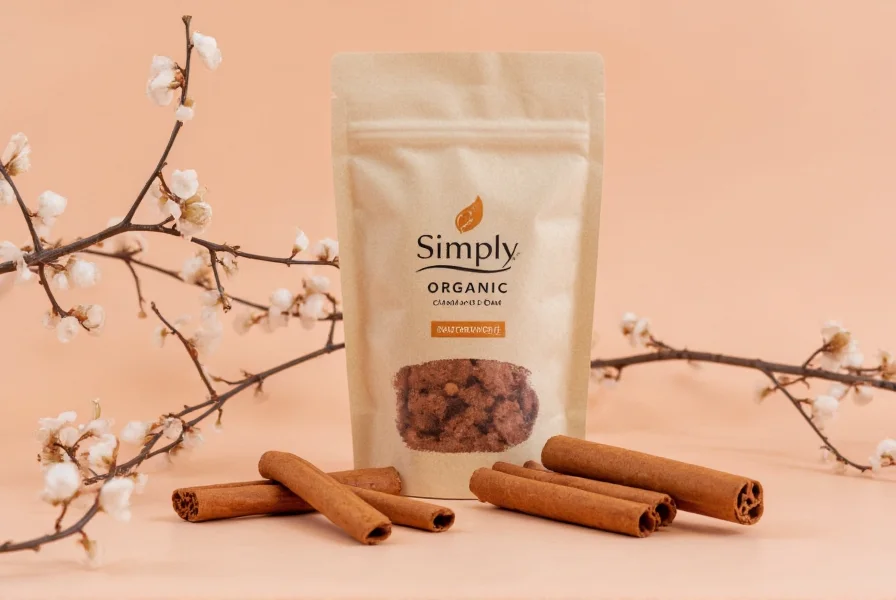Understanding Simply Organic Cinnamon
When you see “simply organic cinnamon” on a product label, it generally means you're getting pure cinnamon that meets strict organic certification standards. This isn't just marketing jargon—it represents specific production and processing protocols that differentiate it from conventional cinnamon.
Organic cinnamon certification requires that the cinnamon trees are grown on land free from prohibited substances for at least three years. The harvesting, drying, and grinding processes must also avoid synthetic additives. The “simply” aspect emphasizes minimal processing—no added preservatives, flow agents, or flavor enhancers that often appear in standard cinnamon products.
Types of Organic Cinnamon Available
Not all cinnamon is created equal, and this holds true in the organic marketplace. Understanding the differences between cinnamon varieties helps you make informed choices:
| Type | Organic Certification Requirements | Distinctive Characteristics |
|---|---|---|
| Ceylon Organic | Must meet USDA NOP or equivalent standards | Delicate flavor, multiple thin layers, lower coumarin content |
| Cassia Organic | Same certification requirements as Ceylon | Bolder flavor, single thick quill, higher coumarin levels |
The term “simply organic” doesn't specify which cinnamon variety you're getting. Many products don't clearly indicate whether they contain Ceylon or Cassia cinnamon, which is important because of significant differences in flavor profile and coumarin content. Ceylon cinnamon generally contains much lower levels of coumarin, a compound that can be harmful in large quantities.
Health Benefits of Pure Organic Cinnamon
Research suggests cinnamon offers several potential health benefits, and choosing organic may enhance certain aspects of its nutritional profile:
- Antioxidant properties: Organic cinnamon often shows higher antioxidant levels due to farming practices that encourage the plant's natural defense mechanisms
- Blood sugar regulation: Studies indicate cinnamon may help improve insulin sensitivity, though more research is needed
- Anti-inflammatory effects: The compound cinnamaldehyde shows promise in reducing inflammation markers
- Heart health support: Some research suggests cinnamon may help lower LDL cholesterol and triglycerides
When evaluating organic cinnamon health claims, look for products that provide third-party testing results rather than relying solely on marketing statements about “simply organic” benefits.
How to Identify Genuine Organic Cinnamon
Not all products labeled “simply organic” meet rigorous standards. Here's how to verify authenticity:
- Check for certification seals: Look for USDA Organic, EU Organic, or other recognized certification logos (not just “organic” written on the label)
- Examine ingredient lists: Truly simply organic cinnamon should list only “cinnamon” as the ingredient
- Research the brand: Reputable organic spice companies often provide transparency about their sourcing
- Observe physical characteristics: Pure organic cinnamon typically has a more vibrant color and stronger aroma than conventional varieties
Be wary of products that make extraordinary health claims while using the “simply organic” label, as legitimate organic certifications focus on production methods rather than therapeutic benefits.
Practical Uses for Simply Organic Cinnamon
Maximizing the flavor and potential benefits of simply organic cinnamon involves proper usage and storage:

Culinary applications: Organic cinnamon works beautifully in both sweet and savory dishes. Try adding it to oatmeal, smoothies, roasted vegetables, or homemade chai blends. Because organic cinnamon often has a more pronounced flavor, you may need slightly less than conventional varieties.
Storage recommendations: Keep your simply organic cinnamon in an airtight container away from light and heat. Whole cinnamon sticks retain their potency longer than ground cinnamon—typically 3-4 years versus 6-12 months for ground.
Dosage considerations: If using Cassia variety organic cinnamon, limit daily consumption to 1-2 teaspoons due to coumarin content. Ceylon variety allows for more liberal use.
Reading Organic Cinnamon Labels Effectively
Understanding what you're actually buying requires careful label examination:
- “Organic” vs. “Certified Organic”: Only products with proper certification can legally use the term “organic” in the US and EU
- “Simply” claims: This marketing term isn't regulated, so verify what it actually means for that specific product
- Country of origin: Ceylon cinnamon primarily comes from Sri Lanka, while Cassia is typically from China, Indonesia, or Vietnam
- Processing information: Truly simply processed organic cinnamon avoids irradiation and ethylene oxide treatment
When comparing products labeled as simply organic cinnamon, look beyond the front packaging to the detailed information on the back label and company website for the most accurate assessment.
Sustainability and Ethical Considerations
Choosing organic cinnamon supports more sustainable agricultural practices:
Organic cinnamon farming prohibits synthetic pesticides that can harm local ecosystems and farm workers. The certification standards also typically require soil conservation practices that prevent erosion on the often steep slopes where cinnamon trees grow.
For those concerned about ethical production, look for products with additional certifications like Fair Trade alongside organic certification. These ensure farmers receive fair compensation and work under safe conditions.
Frequently Asked Questions
Is simply organic cinnamon the same as regular organic cinnamon?
Simply organic cinnamon typically emphasizes minimal processing with no additives beyond the organic certification requirements. While all simply organic cinnamon is certified organic, not all organic cinnamon markets itself as “simply” processed. The “simply” designation usually means no anti-caking agents, artificial flavors, or other additives commonly found in standard organic cinnamon products.
How can I tell if my organic cinnamon is Ceylon or Cassia?
Check the product label for specific variety information, though many products don't specify. Ceylon cinnamon typically appears as multiple thin, papery layers forming a delicate quill, while Cassia has a single thick, hard quill. Ceylon has a lighter brown color and more subtle flavor. If unsure, contact the manufacturer directly for clarification about which cinnamon variety they use in their simply organic products.
Does simply organic cinnamon have more health benefits than regular cinnamon?
The primary health compounds in cinnamon are present in both organic and conventional varieties. However, organic cinnamon may contain higher antioxidant levels due to farming practices that stimulate the plant's natural defense mechanisms. The absence of pesticide residues in organic cinnamon may be beneficial for long-term consumption. The “simply” processing aspect ensures no additional chemicals are introduced during manufacturing, potentially making it a cleaner product overall.
How should I store simply organic cinnamon to maintain freshness?
Store simply organic cinnamon in an airtight glass or metal container away from light, heat, and moisture. Whole cinnamon sticks retain freshness for 3-4 years, while ground cinnamon stays potent for 6-12 months. Avoid plastic containers as cinnamon's essential oils can degrade plastic over time. For longest shelf life, consider storing in the freezer in a properly sealed container.











 浙公网安备
33010002000092号
浙公网安备
33010002000092号 浙B2-20120091-4
浙B2-20120091-4